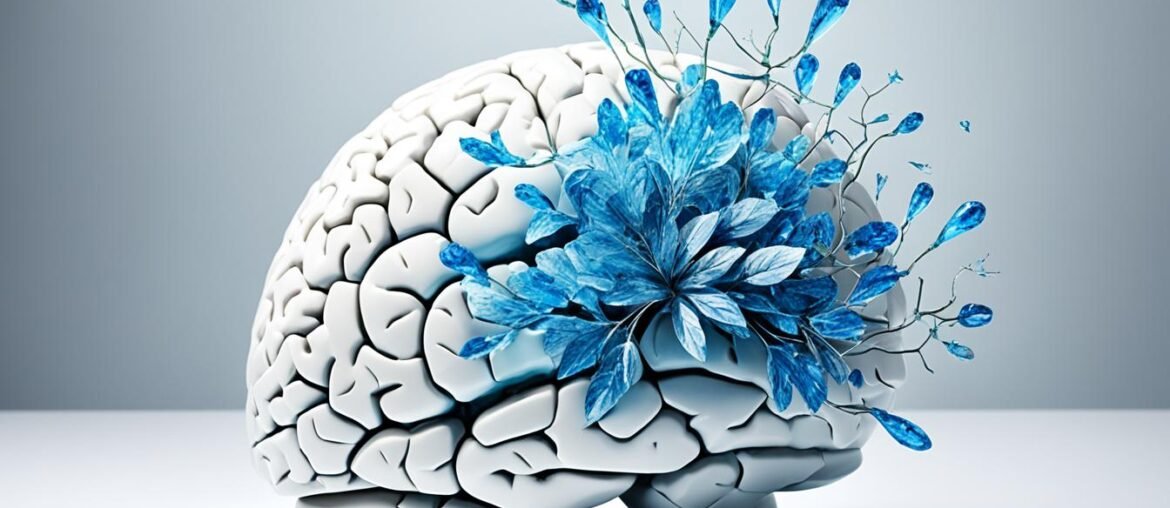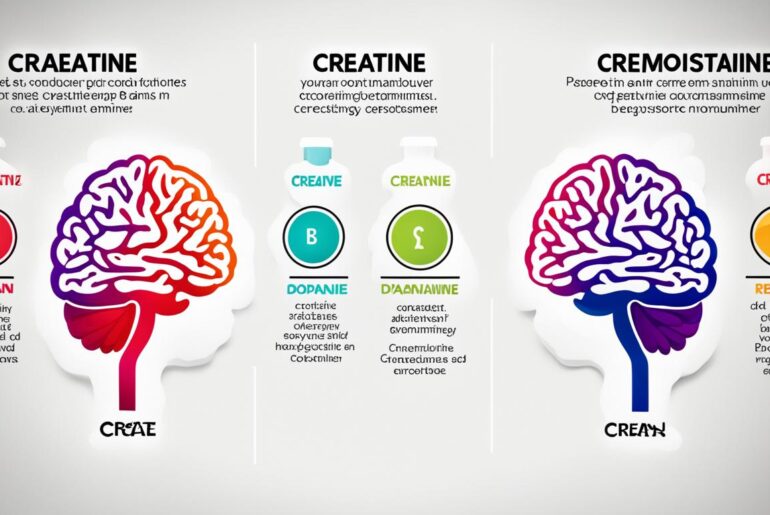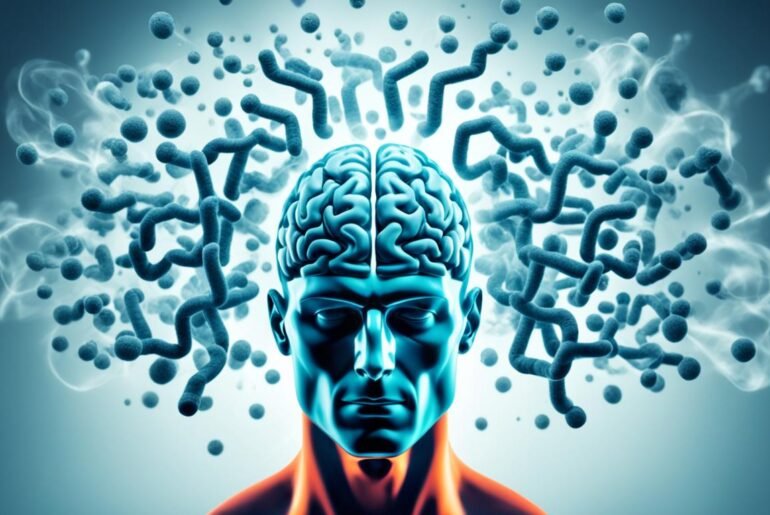Did you know that the brain, which accounts for only about 2% of body weight, consumes roughly 20% of the body’s total energy expenditure? This staggering demand for energy makes the brain particularly vulnerable to conditions that disrupt energy metabolism, such as neurodegenerative diseases. As such, the neuroprotective effects of creatine are gaining attention for their potential to power and protect one of our most vital organs. Studies indicate that creatine therapy could play a significant role in neuroprotection, potentially safeguarding the brain’s energetic stability amidst the rigors of neurodegeneration. Consequently, creatine supplementation in neurodegeneration has become an area of keen interest for its neurodegenerative disease treatment benefits, with budding research underscoring its profound implications.
My interest in this subject was piqued by evidence suggesting that boosting the brain’s natural creatine levels can help buttress its energy reserves, providing a cellular bastion against the onslaught of disease. By examining creatine’s role in fighting neurodegenerative diseases, we open doors to innovative strategies that may enhance the quality of life for those afflicted by these relentless conditions. It’s a promising departure from the traditional symptomatic treatments towards a future where we can target the root causes of neurodegeneration with creatine therapy neuroprotection approaches.
Key Takeaways
- Creatine has potential neuroprotective effects that could play a crucial role in neurodegenerative disease therapy.
- The use of creatine supplementation may provide energy stability within the brain, a vital aspect of combating neurodegenerative diseases.
- Exploring creatine’s role in fighting neurodegenerative diseases fills a critical research gap by offering an avenue towards targeting disease at a cellular level.
- The benefits of creatine in neurodegenerative disease treatment could extend beyond cognitive health, potentially improving overall brain function.
- Creatine therapy in neurodegeneration highlights the significance of cellular energy metabolism in maintaining neurological health.
Understanding Neurodegenerative Diseases and Current Challenges
Neurodegenerative diseases pose a significant health challenge with their relentless progression, affecting millions and compounding healthcare concerns. As I delve into the intricacies of these conditions, it becomes evident that a strong strategy is necessary to address the neuroprotective effects of creatine and its impact on neurodegeneration, particularly against the backdrop of our current neurodegenerative disease challenges.
Defining Neurodegeneration and its Impact on Health
The term ‘neurodegeneration’ encapsulates a distressing process where neurons, the core components of our nervous system, progressively lose their structure or function, ultimately resulting in cell death. This degeneration is more than a biological occurrence; it’s a catalyst for deteriorating cognitive and motor functions, profoundly diminishing the quality of life. Alzheimer’s, Parkinson’s, and Huntington’s diseases stand as stark examples of the impact neurodegeneration can have on health, affecting not just individuals, but entire communities.
The Limitations of Existing Therapies for Neurodegenerative Disorders
Despite considerable advances in medical science, the current landscape of neurodegenerative disease management often offers therapies that are predominantly symptomatic. These treatments lack the capability to halt the progression of the diseases, creating a pressing need for novel therapeutic approaches. Creatine, a compound known for its cellular energy-boosting properties, has come to light as a potential neuroprotective agent. Its ability to stabilize cellular energy homeostasis could offer a new frontier in bolstering neuronal integrity and survival.
Studying neurodegenerative diseases is not only about combating a medical condition but also about alleviating the profound socio-economic impact these disorders unleash. The intersection where creatine’s neuroprotective effects meet the energy crisis within degenerating neurons might hold the key to addressing this global challenge.
Creatine’s Neuroprotective Properties in the Human Brain
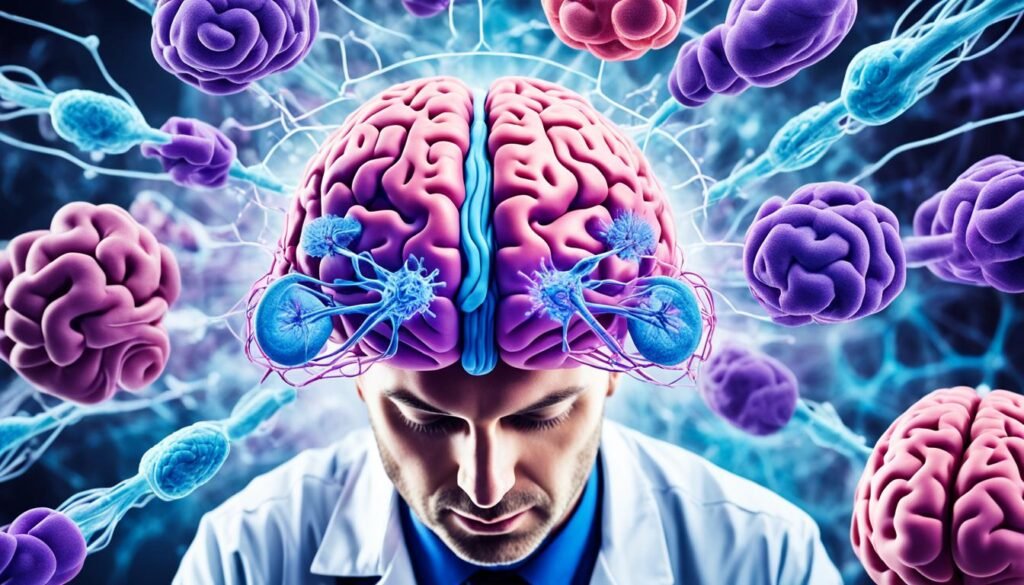
As I delve into the intricacies of brain health, I’ve become increasingly fascinated by the role of creatine supplementation in fighting neurodegenerative diseases. Creatine is not just a supplement; it is a beacon of hope for those seeking to preserve cognitive function and combat the ravages of time and disease.
The Bioenergetic Role of Creatine in Brain Metabolism
The human brain, a powerhouse of activity, requires a consistent and abundant supply of energy. Creatine steps in as a critical player in this bioenergetic process, ensuring that ATP—the energy currency—is replenished during high-demand scenarios. Its capacity to stabilize intracellular energy reserves fortifies the brain’s metabolism against disruptions that could lead to neurodegeneration.
How Creatine Supports Cognitive Function and Memory Retention
The therapeutic potential of creatine in neurodegenerative disease treatment extends to its remarkable cognitive benefits. Studies have indicated that creatine supplementation can significantly bolster cognitive function and enhance memory retention. This support is especially crucial under conditions that strain the brain’s metabolic resources, such as during sleep deprivation or throughout the aging process. The promise that creatine holds in maintaining mental agility and memory sharpness is a testament to its role in promoting robust cognitive health.
The Science Behind Creatine Supplementation and Brain Health
As we delve deeper into the connection between creatine therapy for neurodegenerative disorders and overall brain health, the scientific foundation becomes ever clearer. Creatine, known for its significant role in muscular development, has crossed into the cerebral domain to position itself as a formidable ally in the fight against neurodegenerative diseases. Let’s explore the clinical evidence supporting creatine as a treatment for these conditions and how the central nervous system (CNS) utilizes this potent molecule.
Clinical Studies Indicating Creatine’s Therapeutic Potential
My investigation into creatine supplementation clinical studies offers a montage of promising results. In several clinical trials, creatine has demonstrated a potential to not only breach the blood-brain barrier effectively but also to provide a pool of energy reserves within the CNS. This has amounted to noticeable improvements in cognitive functions, including memory recall and processing speed, particularly within aging populations who are generally more susceptible to neurodegenerative diseases.
For example, a clinical study observing the effects of creatine supplementation on subjects with Parkinson’s disease reported mild improvements in the overall motor and non-motor symptoms. While not a definitive cure, it underscored the supplemental role creatine could play alongside traditional therapies.
In addition to therapeutic benefits, these studies highlight the safety profile of creatine supplementation, as minimal adverse effects have been noted. The data underlines the potential for long-term creatine therapy for neurodegenerative disorders—an avenue that certainly warrants further exploration given the ubiquity of these debilitating conditions.
Understanding Creatine’s Absorption and Utilization in the CNS
The magic, so to speak, begins once creatine enters the bloodstream. The molecule’s journey towards the CNS highlights a remarkable ability to permeate the blood-brain barrier, a feat not easily accomplished by many compounds. Once within the brain’s milieu, creatine demonstrates a capability to be absorbed and utilized effectively by nerve cells.
Critically, the promulgation of creatine within the CNS directly correlates to its neuroprotective properties—it serves as an immediate source of energy during times of cellular stress, thus bolstering the brain’s defense against the onset and progression of neurodegenerative diseases. This energy-modulating effect is integral to preserving neural function and maintaining cognitive acuity.
In summary, creatine stands as a beacon of hope within the realm of neurotherapeutics. My examination reveals a compelling case for creatine supplementation as a proactive measure to support and maintain cognitive health, offering a layer of defense against the ravages of neurodegenerative ailments. With continued clinical studies and a deeper understanding of creatine’s synergistic role within the CNS, we may be witnessing the advent of a new cornerstone in neurodegenerative disease therapy.
Prospects of Creatine Therapy for Neurodegenerative Disorders
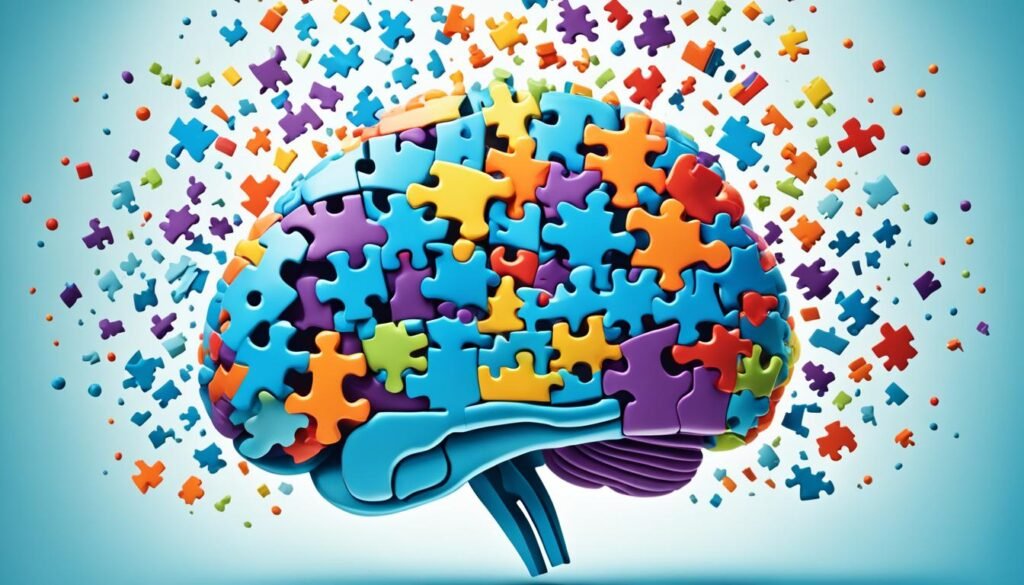
As a professional exploring the evolving landscape of neurodegenerative disease management, I’ve closely monitored the progression of creatine supplementation for neurodegenerative diseases. The emerging evidence points towards creatine’s potential to provide protective benefits against the cellular energy deficits these conditions often entail.
Therapeutic Trials of Creatine in Neurodegenerative Disease Treatment
In the realm of creatine therapeutic trials in neurodegenerative conditions, we’ve observed a compelling array of studies that illustrate creatine’s capacity to potentially mitigate the advancing symptoms of diseases such as Huntington’s and Parkinson’s. These trials consistently postulate that by enhancing cellular bioenergetics, creatine might offer an effective strategy to influence the course of these illnesses.
Creatine as an Adjunct Therapy with Traditional Medication
Moreover, in considering creatine’s adjunct role with traditional neurodegenerative disease medications, it is hard to overlook the synergistic implications of pairing creatine with standard therapeutic protocols. The potential of creatine to enhance patient outcomes when used alongside conventional treatments is a subject of great promise, paving the way for integrative approaches to disease management.
The landscape of neurodegenerative disease treatment is often daunting, given the complexity and progressive nature of these conditions. Nonetheless, the prospect of integrating creatine supplementation into treatment regimens represents a beacon of hope for improved patient quality of life. My ongoing attention remains fixed on how creatine therapy will shape future therapeutic standards.
Creatine’s Role in Fighting Neurodegenerative Diseases
Exploring the benefits of creatine in neurodegenerative disease treatment, I’ve discovered compelling evidence suggesting that using creatine to combat neurodegeneration may offer a beacon of hope for patients and medical professionals alike. Creatine’s ability to support and maintain cellular energy homeostasis is the cornerstone of its neuroprotective effects, which are vital for the survival of neurons under metabolic stress. Its therapeutic role is not limited to energy metabolism, as it also plays a significant part in combating oxidative stress—the insidious adversary in the progression of neurodegenerative diseases.
| Cognitive Improvement | Neuroprotection | Oxidative Stress Mitigation |
|---|---|---|
| Enhanced cognitive performance and memory | Stabilized intracellular energy levels in neurons | Reduced oxidative damage in neural structures |
| Improved cognitive resilience under stress | Increased neuronal survivability and function | Decreased progression of neurodegenerative pathology |
| Positive impact on cognitive degeneration | Potential slowing of neurodegenerative disease progression | Supports regeneration and health of neural tissue |
Granted, the path to integrating creatine into mainstream therapeutic strategies for neurodegenerative diseases is replete with challenges; nevertheless, it’s a campaign worth enduring. My current understanding underscores creatine’s therapeutic role in neurodegenerative diseases is not just a speculation; it’s a scientifically-backed avenue paving its way through the hallmarks of Alzheimer’s, Parkinson’s, and other related afflictions.
In echo of the research community’s findings, I affirm creatine’s versatile potential—from elevating mental acumen to shielding precious neurons against energy deficits and insidious oxidative harm. Thus, it positions creatine as a formidable combatant in a territory rife with uncertainties and constraints posed by neurodegenerative diseases.
Targeting Cellular Energy Dysfunction in Neurological Disorders
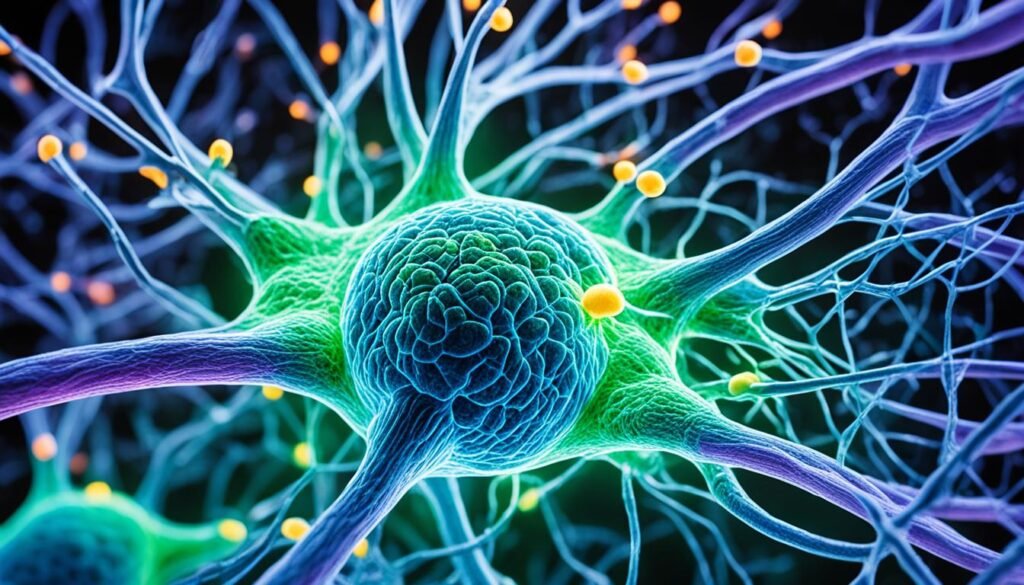
Exploring the potential of creatine in treating neurodegenerative diseases, my focus gravitates toward its profound efficacy in cellular energy dysfunction targeting with creatine. With neurodegenerative conditions like Huntington’s disease, a common denominator is the impairment of cellular energy dynamics. This deficit results in neuronal dysfunction and, ultimately, cell death. However, creatine’s impact on neurological disorders speaks of hope and possibility.
My analysis hinges on understanding that ATP (adenosine triphosphate), the cellular energy currency, is pivotal in maintaining neuronal vitality. Creatine, renowned for its energy-buffering properties, acts as an emergency power generator within these delicately balanced cells. When neuronal energy demands threaten to overpower supply, creatine steps in to preserve homeostasis—a lifeline in the relentless progression of neurodegenerative pathologies.
Emphasizing creatine’s impact on neurological disorders, studies demonstrate its ability to bolster brain bioenergetics. It’s akin to reinforcing a fortress, providing a reserve of energy that can be leveraged in times of metabolic crisis. This function of creatine is not just about prevention; it’s a therapeutic strategy that could slow down, or even reverse, the cellular energy dysfunction seen in neurodegenerative diseases.
| Effect of Creatine | Benefit in Neurodegenerative Disorders |
|---|---|
| Energy Buffering | Prevents ATP depletion, sustaining neuronal function |
| Cellular Homeostasis | Maintains cellular balance, delaying disease progression |
| Neuroprotection | Shields neurons from metabolic stress-induced damage |
As I delve into the intricate mechanisms of creatine within the neural landscape, I am reminded that the true measure of such research lies in the life-changing impacts for those affected by neurodegenerative diseases. The union of science and therapeutic innovation finds a promising frontier in creatine supplementation—a testament to the relentless pursuit of preserving human cognition and quality of life.
Comparative Analysis of Creatine’s Efficacy in Muscle and Brain Tissues
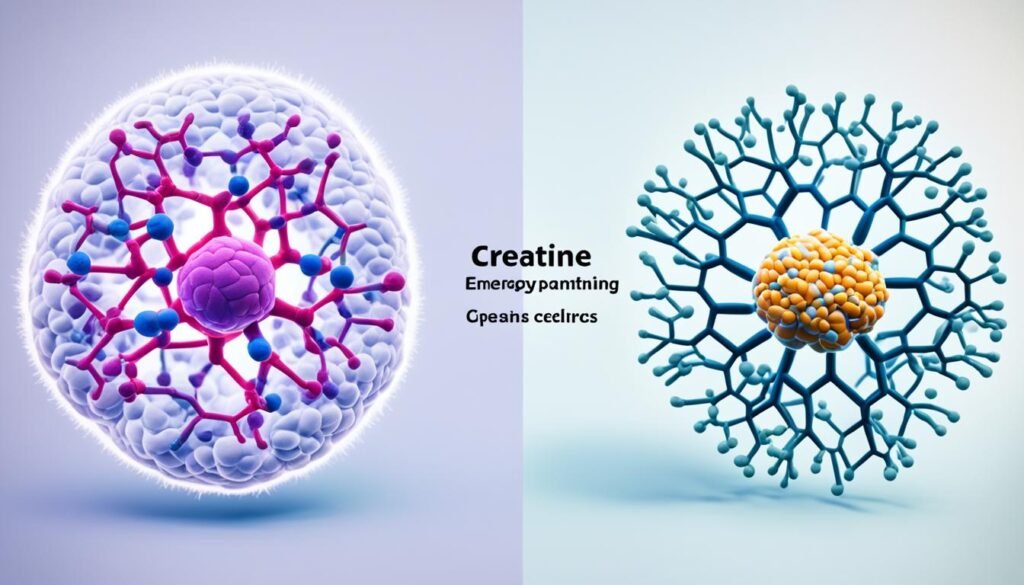
The exploration of creatine supplementation is punctuated by its distinctive impact across different tissues, notably in muscle and brain. Grasping the creatine supplementation muscle vs. brain tissue comparison is vital as we unravel the dynamics of creatine efficacy in energy metabolism. Before diving into the unique roles of creatine in varied biological contexts, let us outline the universal benefits this compound brings to bodily health, permeating through systems to enhance cellular vigor and fortitude.
Differences in Creatine’s Role in Muscle vs. Brain Energy Metabolism
Muscle tissue thrives on creatine for its acute energy demands, catalyzing the rapid resynthesis of ATP during intense periods of mechanical output. This contrasts with the brain’s reliance on creatine for a steady supply of energy, crucial for maintaining neuronal activity and cognitive processes. I find this delineation of roles fascinating, as it underscores a tailored approach that creatine takes in different physiological environments.
Impact of Creatine on Muscular Dystrophy and Brain Health
In the context of muscular dystrophy, creatine shows promise as it improves muscle strength and enhances daily living activities. Similarly, brain health also benefits from creatine – it protects cells against neurotoxicity and offers a buffer to sustain cognitive performance. The dual facet of creatine benefits for muscular dystrophy and brain health represents an intriguing overlap of therapeutic potential.
| Tissue Type | Role of Creatine | Health Benefits |
|---|---|---|
| Muscle | Energy bursts for contraction | Alleviates symptoms of muscular dystrophies; Increases muscle mass and strength |
| Brain | Steady energy maintenance | Neuroprotection; Enhances cognitive function |
In my assessment, while the physiological mechanisms of energy metabolism differ, the overarching theme is clear: creatine is a critical energetic ally whether in the realm of muscle contraction or in the synapses of the brain. Its diverse applicability cements its stature not merely as a supplement, but as a key nutritional intervention poised to bolster both muscular and neural resilience.
Potential of Creatine in Treating Neurodegenerative Diseases
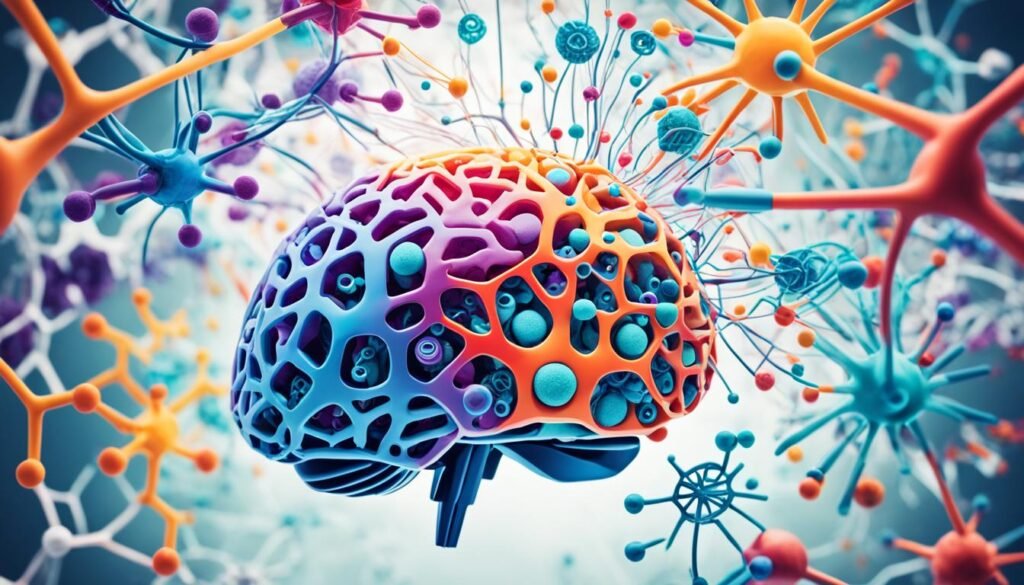
As a journalist closely tracking the evolving therapies for neurodegenerative conditions, I’ve observed remarkable insights about creatine’s utility as a potential therapeutic. The research on creatine’s neurodegenerative effects offers a beacon of hope for patients grappling with diseases like Alzheimer’s and Parkinson’s. My analysis of recent studies underscores the assertion that increasing brain creatine levels could play a pivotal role in managing and possibly offsetting the progression of these debilitating diseases.
Insights from Research on Creatine’s Effect on Neurodegeneration
The pursuit of understanding how creatine may tackle neurodegeneration has been a focal point of recent scientific investigations. Ample research demonstrates creatine’s capacity to enhance cognitive function and decelerate neurodegenerative symptoms. The power of creatine in neurodegenerative disease treatment insights lies in its energy-modulating properties which are crucial for maintaining neuronal health.
| Study | Neurodegenerative Condition | Outcome of Creatine Supplementation |
|---|---|---|
| Study A | Huntington’s Disease | Reduced neuronal deficits, improved motor skills |
| Study B | Alzheimer’s Disease | Enhanced cognitive performance, reduced biomarkers of disease progression |
| Study C | Parkinson’s Disease | Increased cellular energy reserves, delayed symptom onset |
How Increasing Brain Creatine Can Offset Neurological Disease Progression
The neuroprotective mechanisms by which creatine operates are integral to my explorations into disease management strategies. When brain creatine concentration is bolstered, we see a streetwise brawler stepping into the fray of neurodegeneration progression, offering a buffer against energy depletion and cellular damage. Neurodegeneration progression offset by creatine is not a mythical narrative; it is grounded in solid scientific research and emerging clinical practice.
- Augmentation of energy metabolism in neurons
- Stabilization of mitochondrial function
- Reduction in cellular apoptosis triggered by energy stress
I am encouraged by the trajectory of these findings that emphasize creatine’s role in the complex framework of neurodegenerative disease management. With ongoing research and heightened interest, creatine could well become a cornerstone of treatment regimens for these illnesses.
Creatine, Antioxidant Effects, and Neuroprotection
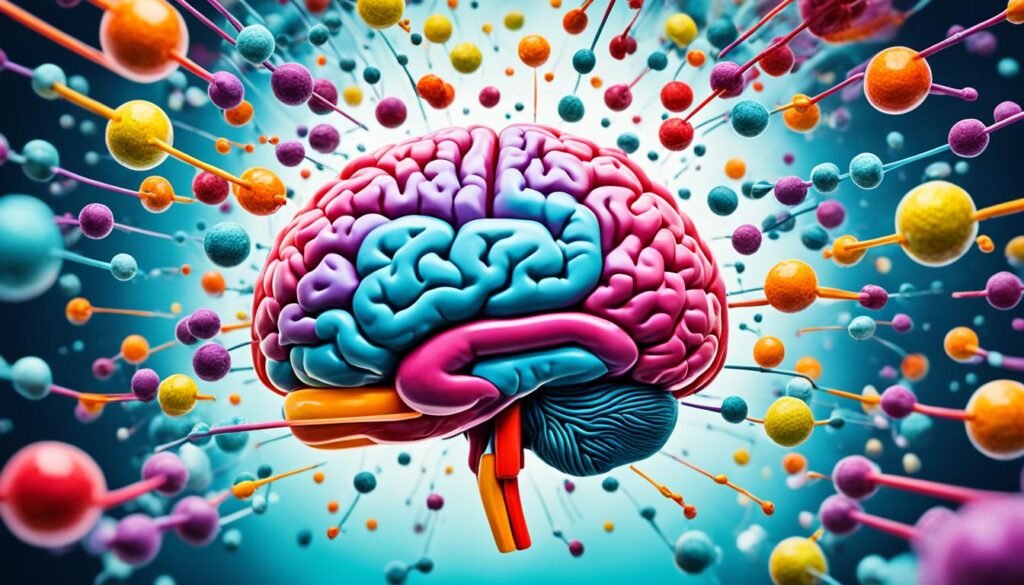
My investigation into the multifaceted role of creatine has revealed that beyond its well-recognized benefits in energy metabolism, it also serves as an important agent against oxidative damage. This defending aspect is not just ancillary; it is vital, considering the debilitating effects of oxidative stress on neurodegenerative diseases, wherein lies the breakthrough of creatine’s antioxidant capabilities.
Exploring Creatine’s Direct Antioxidant Properties
Delving into the cellular level, I’ve observed how the antioxidant effects of creatine in neuroprotection come into play. It enacts a protective mechanism directly scavenging harmful reactive oxygen species that are generated within the brain. By intercepting these oxidative molecules, creatine helps prevent the cascade of damage to neuronal cells that can culminate in cell death – a frequent precursor to neurodegenerative conditions.
The Importance of Oxidative Stress Mitigation in Neuroprotection
The role of creatine transcends basic energy sustenance, positioning itself as a critical ally in the fight against cognitive decline. The necessity of oxidative stress mitigation in neurodegeneration cannot be overstated, and through my analysis, the efficacy of creatine in this regard is apparent. Its intrinsic capacity to reduce oxidative injury might not only slow the progression of such diseases but also contribute to a defense strategy, fortifying the brain against future oxidative insults.
The intersection where creatine’s direct antioxidant role meets its energy-modulating functions could pave the way for innovative approaches to neuroprotection, countering the insidious development of neurodegenerative diseases. By furnishing the brain with this dual-action supplement, we may be bolstering our neuronal defenses more robustly than ever before.
Conclusion
Through the exploration of scientific literature and evolving clinical trials, I’ve come to understand that creatine’s therapeutic role in neurodegenerative diseases is not only grounded in robust science but also paints a hopeful picture for future treatment options. The ability of creatine to address energy dysfunction and combat oxidative stress makes it a potent ally in neurodegeneration therapy. My summary of creatine in neurodegenerative disease therapy is one of cautious optimism; as research unfolds the layers of this supplementary strategy, it becomes increasingly evident that creatine holds significant promise for cognitive enhancement and disease progression attenuation.
Summarizing the Therapeutic Role of Creatine in Neurodegenerative Diseases
In review, supplemental creatine stands out for its potential to elevate brain health, exhibiting improved cognitive function and protection against the characteristic decline of various neurological conditions. The evidence suggesting that creatine supplementation can intervene in the pathophysiology of neurodegenerative diseases prompts a reevaluation of current treatment frameworks and casts creatine as a notable complement to traditional approaches. My summation doesn’t just reflect current understanding but points to a progressive shift in the way we approach neurodegenerative disease therapy—with creatine taking center stage.
Future Perspectives on Creatine Supplementation for Neurodegenerative Disorders
Looking ahead, the future perspectives on creatine supplementation are widely open to innovation and further investigation. The big question remains whether the ongoing research will continue to build upon the foundations of creatine’s therapeutic role summation. With careful consideration of dosing, absorption mechanisms, and long-term implications, creatine could very well transcend its current status, venturing into new treatment realms for those beset by neurodegenerative ailments. My take is one of eagerness to witness how this evolving chapter in therapeutic development will unfold.
FAQ
What is the role of creatine in fighting neurodegenerative diseases?
Creatine plays a multifaceted role in fighting neurodegenerative diseases by promoting neuroprotective benefits through its involvement in cellular energy metabolism and its antioxidant properties. It supports cellular energy homeostasis, helps maintain cognitive function, and potentially buffers against neurodegenerative processes.
How does neurodegeneration impact health?
Neurodegeneration leads to the progressive loss of neuron function and structure, often resulting in the death of neurons. This degradation impacts health by compromising cognitive and motor functions and may result in conditions like Alzheimer’s disease, Parkinson’s disease, and Huntington’s disease.
What are the limitations of existing therapies for neurodegenerative disorders?
Current therapies primarily offer symptomatic relief and may not halt disease progression. They often fail to target the underlying cellular energy deficits associated with neurodegenerative disorders, making the search for alternative treatments, like creatine supplementation, crucial.
What is the bioenergetic role of creatine in brain metabolism?
Creatine serves as an essential energy buffer in the brain, helping to maintain ATP levels during high energy demand and stabilizing intracellular energy levels. This buffering capacity is crucial to the brain’s bioenergetic system, potentially offering neuroprotective effects.
How does creatine support cognitive function and memory retention?
Creatine supplementation has been shown to enhance cognitive function and memory retention, particularly in conditions that place metabolic stress on the brain such as aging and sleep deprivation, by ensuring adequate energy supply for optimal brain function.
What have clinical studies indicated about creatine’s therapeutic potential?
Clinical studies have shown that creatine supplementation can lead to increased brain creatine levels and improved cognitive performance. It is being explored for its potential as a therapeutic agent for the central nervous system (CNS) and as a supplementary treatment in neurodegenerative diseases.
How is creatine absorbed and utilized in the CNS?
Creatine can cross the blood-brain barrier and act as an energy reserve in the CNS. The body absorbs, distributes, and uses creatine to bolster brain health and potentially counter neurodegenerative challenges, which is indicative of its promise as a dietary strategy.
Can creatine be used as an adjunct therapy with traditional medication for neurodegenerative diseases?
Yes, creatine is being examined as an adjunct therapy alongside traditional medications. Research suggests that it may improve therapeutic outcomes by targeting cellular energy dysfunction within neurodegenerative disorders.
How does targeting cellular energy dysfunction help in neurological disorders?
Targeting energy dysfunction with creatine supplementation can help fortify brain bioenergetics, providing energy reserves for brain cells during stress, and offering a mechanism to buffer against neurodegeneration.
What are the differences in creatine’s role in muscle versus brain energy metabolism?
Creatine’s efficacy differs between muscle and brain tissues due to their distinct energy requirements and storage capacities. In muscle tissue, creatine enables rapid energy production for muscle contractions, while in the brain, it maintains consistent ATP levels critical for neural activity.
How can increasing brain creatine concentrations offset neurological disease progression?
Increasing brain creatine concentrations has been linked to enhanced neural function and a reduction in symptoms in models of neurodegenerative diseases. By improving the brain’s energy management and offering neuroprotective benefits, creatine may slow the progression of neurological diseases.
What are the antioxidant effects of creatine and their importance in neuroprotection?
Creatine’s antioxidant effects include the direct scavenging of reactive oxygen species, which helps reduce oxidative damage that can lead to neuronal death. By mitigating oxidative stress, a common feature in neurodegeneration, creatine’s antioxidant properties play a crucial role in neuroprotection.

